Religion in Brazil
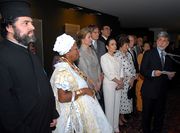
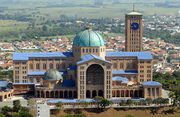
Religion in Brazil has a higher adherence level compared to other Latin American countries, and is more diverse.
In 1889, when the Brazilian Constitution was set forth, Brazil ceased to have an official religion. The Constitution guarantees absolute freedom of religion. Over seventy percent (70%) of the population declared themselves Roman Catholic in the last census (2000).[2] However, there are many other religious denominations in Brazil. Some of these churches are the: Protestant, Pentecostal, Episcopal, Methodist, Lutheran, and Baptist. There are over a million and a half Spiritists or Kardescists who follow the doctrines of Allan Kardec. There are followers of The Church of Jesus Christ of Latter-day Saints, small minorities of Jews, Muslims, Buddhists and numerous followers of Candomble and Umbanda.[3]
Brazilian religions are very diversified and inclined to syncretism. In recent decades, there has been a great increase of Neo-Pentecostal churches, which has decreased the number of members to both the Roman Catholic Church and the Afro-Brazilian religions.[4] About ninety percent of Brazilians declared some sort of religious affiliation in the most recent census.[5]
Contents |
Overview
| Distribution of the Brazilian population according to their religions and faiths[2] | ||
|---|---|---|
| Religion | Population (million) | Proportion (%) |
| Roman Catholicism | 130 | 74% |
| Protestantism | 25 | 15.4% |
| No religious affiliation, agnostics and atheists | 12 | 7.4% |
| Spiritism | 2.2 | 1.3% |
| Afro-Brazilian Religions | 0.3% | |
| Other religions | 1.7% | |
Christianity
Catholicism
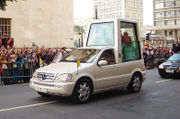
Brazil has the largest number of Catholics in the world.[2] Roman Catholicism has been Brazil's main religion since the beginning of the 16th century. It was introduced among the Native Brazilians by Jesuits missionaries and also observed by all the Portuguese first settlers.
During colonial times, there was no freedom of religion. All Portuguese settlers and Brazilians were compulsorily bound to the Roman Catholic faith and forced to pay taxes to the church. After the Brazil's independence, the first constitution introduced freedom of religion in 1824, but Roman Catholicism was kept as the official religion. The Imperial Government paid a salary to Catholic priests and influenced the appointment of bishops. The political-administrative division of the municipalities accompanied the hierarchical division of the bishoprics in "freguesias" (parishes). There was also some hindrances to the construction of temples and cemeteries that belonged to the Catholic Church. The first Republican Constitution in 1891 separated religion from state and made all religions equal in the Codes of Law, but the Catholic Church remained very influential until the 1970s. For example, due to the strong opposition of the Catholic Church, divorce was not allowed in Brazil until 1977 even if a separated couple observed a different religion.
The Catholicism practiced in Brazil is full of popular festivities rooted in centuries-old Portuguese traditions, but also heavily influenced by African and Native Brazilian usage. Popular traditions include pilgrimages to the National Shrine of Our Lady of Aparecida (Nossa Senhora Aparecida), the patron saint of Brazil, and religious festivals like the "Círio de Nazaré" in Belém and the "Festa do Divino" in many cities of Central Brazil. Areas that received many European immigrants in the last century, specially Italian and German, have Catholic traditions closer to that practiced in Europe.
The largest proportion of Catholics is concentrated in the Northeast (79.9%) and South (77.4%) regions. The smallest proportion of Catholics is found in the Center-West region (69.1%). The State of Piauí has the largest proportion of Catholics (90.03%) and the State of Rio de Janeiro has the smallest one (56.19%). Among the state capitals, Teresina has the largest proportion of Catholics in the country (86.09%), followed by Aracaju, Fortaleza, Florianópolis and João Pessoa.[6][7]
Protestantism
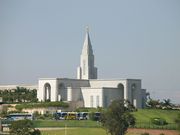
Brazil has many offshoots of Christianity. These include neo-Pentecostalists, old Pentecostalists and Traditional Protestants (most of them Baptists, Presbyterians and Methodists) predominantly from Minas Gerais to the South. In the same region, mainly Minas Gerais and São Paulo, large sections of the middle class, about 1-2% of the total population, is Kardecist, sometimes pure, sometimes in syncretism with Roman Catholicism. The Anglican Episcopal Church of Brazil, part of the Anglican Communion, has some 120,000 members. Protestantism is generally the only religion in Brazil relatively free of syncretism.[8]
Centers of neo-Pentecostalism are Londrina in Paraná state, as well the cities of São Paulo, Rio de Janeiro and Belo Horizonte (capital of Minas Gerais), especially the suburban and nearby areas of these cities. Lutherans are concentrated mostly in the states of Rio Grande do Sul, Santa Catarina and in countryside regions of the states of Rio de Janeiro and Espírito Santo.
Brazil has a large number of Jehovah's Witnesses (about 199.645).
The largest proportion of Protestants is found in North (19.8%), Central-West (18.9%) and Southeast (17.5%) regions. Among the state capitals, Rio de Janeiro has the largest proportion of non-Pentecostal Protestants in the country (10.07%), followed by Vitória, Porto Velho, Cuiabá and Manaus. But Goiânia is the state capital with the largest proportion of Pentecostal Protestants in the country (20.41%), followed by Boa Vista, Porto Velho, Belém and Belo Horizonte.[9][10]
Others
The Church of Jesus Christ of Latter-day Saints has a membership of 1.104.886,[11]
The Eastern Orthodox Christian population is 500,000, composed of churches brought over by waves of Lebanese, Syrian, Armenian, Greek, Russian and Ukrainian immigrants in the past century.[12]
African and Indigenous Religions
Afro-Brazilian religions are syncretic religions, such as Candomblé, that have many followers, mainly Afro-Brazilians. They are concentrated mainly in large urban centers in the Northeast, such as Salvador, Recife, or Rio de Janeiro in the Southeast. The cities of São Paulo, Porto Alegre and Florianópolis have a great number of followers, but in the South of Brazil the most common African influenced Ritual is Almas e Angola, which is an Umbanda like ritual. Nowadays, there are over 70 "Terreiros" in Florianópolis, which are the places where the rituals run. In addition to Candomblé which is the survival of West African religion, there is also Umbanda which blends Spiritism, Indigenous and African beliefs. There is prejudice about "African cults" in Brazil's south, but there are Catholics, Protestants and other kinds of Christians who also believe in the Orishas, and go both to Churches and Terreiros.
Candomblé, Umbanda, Batuque, Xango, and Tambor de Mina, were originally brought by black slaves shipped from Africa to Brazil. These black slaves would summon their gods, called Orixas, Voduns or Inkices with chants and dances they had brought from Africa. These cults were persecuted throughout most of Brazilian history, largely because they were believed to be pagan or even satanic. However, the Brazilian republican government legalized all of them on the grounds of the necessary separation between the State and the Church in 1889.
In current practice, Umbanda followers leave offerings of food, candles and flowers in public places for the spirits. Candomblé terreiros are more hidden from general view, except in famous festivals such as Iyemanja Festival and the Waters of Oxala in the Northeast.
From Bahia northwards there are different practices such as Catimbo, Jurema with heavy Indigenous elements. All over the country, but mainly in the Amazon rainforest, there are many Indians still practicing their original traditions. Many of their beliefs and use of naturally occurring plant derivatives are incorporated into African, Spirtitualists and folk religion.
Other Religions
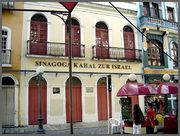
There are small populations of people professing Judaism (186,000), Islam (227,000), Buddhism (215,000), Shinto, Rastafarian and a few other religions. They comprise 20th century immigrants from East Asia, the Middle East and Eastern Europe, or of recent immigrant descent.
Seven percent of the population consider themselves agnostics or atheists. One of the most unusual features of the rich Brazilian spiritual landscape are the sects which use ayahuasca (an Amazonian entheogenic tea), including Santo Daime, União do Vegetal, and Centro de Cultura Cósmica.
This syncretism, coupled with ideas prevalent during the military dicatorship, has resulted in a church for the secular, based on philosopher Auguste Comte's principles of positivism, based at the Positivist Church of Brazil in Rio de Janeiro.[13]
Judaism
The first Jews arrived in Brazil as cristãos-novos (New Christians) or conversos, names applied to Jews or Muslims who converted to Catholicism, most of them forcibly. According to the Inquisition reports, many New Christians living in Brazil during colonial times were condemned for secretly observing Jewish customs.[14] These reports may not be reliable since the Inquisition confiscated the earthly goods of its victims, and had a direct interest in denouncing and convicting them.
In 1630, the Dutch conquered portions of northeast Brazil and permitted the open practice of any religion. Many Jews came from the Netherlands to live in Brazil in the area dominated by the Dutch. Most of them were descendants of the Portuguese Jews who had been expelled from Portugal in 1497. In 1636, the Kahal Zur Israel Synagogue, the first synagogue in the Americas was built in Recife, the capital of Dutch Brazil.[14] The original building remains to this day,[15] but the Jews were forced to leave Brazil when the Portuguese-Brazilians retook the land in 1654.[16]
The first Jews that stayed in Brazil and openly practiced their religion came when the first Brazilian constitution granted freedom of religion in 1824, just after the independence. They were mainly Moroccan Jews, descendants of the Spanish and Portuguese Jews who had been expelled from Spain in 1492 and Portugal in 1497.
The first wave of Sephardic Jews was exceeded by the larger wave of immigration by Ashkenazi Jews that came at the end of the 19th and beginning of the 20th centuries, mainly from Russia, Poland, Belarus and Ukraine. A final significant group came, fleeing Nazism or the destruction that followed World War II.
There are about 196,000 Jews in Brazil.[17] The largest proportion of Jews is found in the states of São Paulo and Rio de Janeiro.[18]
Islam
According to the 2007 Census, there were 27,239 Muslims in Brazil.[2] Islam in Brazil may be presumed to have first been practiced by African slaves brought from West Africa, but they left no descendants that practiced their faith. Scholars note that Brazil received more enslaved Muslims than anywhere else in the Americas.[19]
Today, the Muslim population in Brazil is made up of mostly Arab immigrants and their descendants. There are approximately fifty-five mosques and Muslim religious centers.[20] The largest proportion of Muslims is found in São Paulo and Paraná states.[20]
Beliefs
A 2007 poll, made by Datafolha and published in newspaper Folha de S. Paulo, asked diverse questions about the beliefs of the Brazilian people. In this poll, 64% reported to be Catholics, 17% Pentecostal Protestants, 5% non-Pentecostal Protestants, 3% Kardecists or Spiritists, 3% followers of other religions, 7% non-religious or atheists. Less than 1% reported to follow Afro-Brazilian religions.[21][22][23]
- 97% Of Brazilians reported to believe in God; 2% have doubts and 1% do not believe in God.
- 75% Reported to believe in the Devil, 9% have doubts and 15% do not believe in the Devil.
- 81% Of non-religious reported to believe in God.
- About Jesus Christ
- 93% Reported they believe Jesus Christ rose after death; 92% that the Holy Spirit exists; 87% in the occurrence of miracles; 86% that Mary gave birth to Jesus as a virgin; 77% that Jesus will return to Earth at the end of time; 65% that the sacramental bread is the body of Jesus; 64% that after death some people go to Heaven; 58% that after death some people go to Hell and 60% that there is life after death.
- Belief in saints
- 57% Believe there are saints.
- 49% Pray to a saint (68% among self-declared Catholics and 76% among followers of Umbanda).
- 18% Pray to Our Lady of Aparecida (26% among Catholics); Saint Anthony, Saint Expeditus (5% each), Saint George (3%), Saint Jude, Saint Francis of Assisi and Saint Joseph (2% each).
- About the Catholic priests
- 51% Believe some priests respect chastity, 31% most, 8% none and 4% they all do.
- 66% That priests should be allowed to marry (59% among Catholics and 94% among followers of Candomblé).
- About the sexual abuse scandals involving priests, 38% believe some of the complaints are true, 30% most are, 21% all are and 4% none of them.
- About different religions
- About the sentence "Catholics do not practice their religion", 19% reported to agree completely and 41% agreed, but not completely.
- About the sentence "the Protestants are misled by their priests", 61% agreed (77% among the Kardecists, 67% among Catholics and 45% among Protestants).
- About the sentence "Umbanda is a Devil thing", 57% agreed (83% among Evangelical Protestants, 53% among Catholics and 12% among Umbandists).
- About the sentence "Jews only think about money", 49% agreed.
- About the sentence "Muslims advocate terrorism", 49% agreed.
Table of Religions in Brazil
| Religion or faith | Total | "by region" | "by gender" | |||||||||
|---|---|---|---|---|---|---|---|---|---|---|---|---|
| urban | rural | men | women | |||||||||
| contingent | % | contingent | % | contingent | % | contingent | % | contingent | % | |||
| (total) | 169.872.856 | 100,00 | 137.925.238 | 100,00 | 31.947.618 | 100,00 | 83.602.317 | 100,00 | 86.270.539 | 100,00 | ||
| Roman Catholics (total) | 125.518.774 | 73,89 | 98.939.872 | 71,73 | 26.578.903 | 83,20 | 62.171.584 | 74,37 | 63.347.189 | 73,43 | ||
| · | Roman Catholic Church | 124.980.132 | 73,57 | 98.475.959 | 71,40 | 26.504.174 | 82,96 | 61.901.888 | 74,04 | 63.078.244 | 73,12 | |
| · | Brazilian Catholic Apostolic Church | 500.582 | 0,295 | 430.245 | 0,312 | 70.337 | 0,220 | 250.201 | 0,299 | 250.380 | 0,290 | |
| Greek Orthodox Church | 38.060 | 0,022 | 33.668 | 0,024 | 4.392 | 0,014 | 19.495 | 0,023 | 18.565 | 0,022 | ||
| Protestant Churches (total) | 26.184.941 | 15,41 | 22.736.910 | 16,48 | 3.448.031 | 10,79 | 11.444.063 | 13,69 | 14.740.878 | 17,09 | ||
| · | Missionaries - traditional Protestantism (total) | 6.939.765 | 4,085 | 6.008.100 | 4,356 | 931.665 | 2,916 | 3.062.194 | 3,663 | 3.877.571 | 4,495 | |
| · | · | Baptist | 3.162.691 | 1,862 | 2.912.163 | 2,111 | 250.528 | 0,784 | 1.344.946 | 1,609 | 1.817.745 | 2,107 |
| · | · | Seventh-day Adventist Church | 1.209.842 | 0,712 | 1.029.949 | 0,747 | 179.893 | 0,563 | 538.981 | 0,645 | 670.860 | 0,778 |
| · | · | Lutheran Church | 1.062.145 | 0,625 | 681.345 | 0,494 | 380.800 | 1,192 | 523.994 | 0,627 | 538.152 | 0,624 |
| · | · | Presbyterian | 981.064 | 0,578 | 904.552 | 0,656 | 76.512 | 0,239 | 427.458 | 0,511 | 553.606 | 0,642 |
| · | · | Methodist Church | 340.963 | 0,201 | 325.342 | 0,236 | 15.620 | 0,049 | 146.236 | 0,175 | 194.727 | 0,226 |
| · | · | Congregational | 148.836 | 0,088 | 125.117 | 0,091 | 23.719 | 0,074 | 64.937 | 0,078 | 83.899 | 0,097 |
| · | · | other | 34.224 | 0,020 | 29.630 | 0,021 | 4.593 | 0,014 | 15.642 | 0,019 | 18.582 | 0,022 |
| · | Pentecostal (total) | 17.617.307 | 10,37 | 15.256.085 | 11,06 | 2.361.222 | 7,391 | 7.677.125 | 9,183 | 9.940.182 | 11,52 | |
| · | · | Assembly of God | 8.418.140 | 4,956 | 6.857.429 | 4,972 | 1.560.711 | 4,885 | 3.804.658 | 4,551 | 4.613.482 | 5,348 |
| · | · | Christian Congregation of Brazil | 2.489.113 | 1,465 | 2.148.941 | 1,558 | 340.172 | 1,065 | 1.130.329 | 1,352 | 1.358.785 | 1,575 |
| · | · | Universal Church of the Kingdom of God | 2.101.887 | 1,237 | 1.993.488 | 1,445 | 108.399 | 0,339 | 800.227 | 0,957 | 1.301.660 | 1,509 |
| · | · | International Church of the Foursquare Gospel | 1.318.805 | 0,776 | 1.253.276 | 0,909 | 65.529 | 0,205.5214 | 545.016 | 0,6526445 | 773.789 | 0,897 |
| · | · | God is Love Pentecostal Church | 774.830 | 0,456 | 649.252 | 0,471 | 125.577 | 0,393 | 331.707 | 0,397 | 443.123 | 0,514 |
| · | · | Igreja Cristã Maranata | 277.342 | 0,163 | 266.539 | 0,193 | 10.803 | 0,034 | 117.789 | 0,141 | 159.553 | 0,185 |
| · | · | Brazil for Christ Pentecostal Church | 175.618 | 0,103 | 159.713 | 0,116 | 15.904 | 0,050 | 76.132 | 0,091 | 99.485 | 0,115 |
| · | · | Igreja Tabernáculo Evangélico de Jesus | 128.676 | 0,076 | 120.891 | 0,088 | 7.785 | 0,024 | 51.557 | 0,062 | 77.119 | 0,089 |
| · | · | Igreja Cristã de Nova Vida | 92.315 | 0,054 | 91.008 | 0,066 | 1.307 | 0,004 | 35.352 | 0,042 | 56.964 | 0,066 |
| · | · | Other | 1.840.581 | 1,084 | 1.715.548 | 1,244 | 125.033 | 0,391 | 784.359 | 0,938 | 1.056.222 | 1,224 |
| · | no institutional links (total) | 1.046.487 | 0,616 | 945.874 | 0,686 | 100.612 | 0,315 | 454.087 | 0,543 | 592.400 | 0,687 | |
| · | · | Pentecostal | 336.259 | 0,198 | 305.734 | 0,222 | 30.525 | 0,096 | 144.707 | 0,173 | 191.552 | 0,222 |
| · | · | Other | 710.227 | 0,418 | 640.140 | 0,464 | 70.087 | 0,219 | 309.380 | 0,370 | 400.847 | 0,465 |
| · | Other evangelical | 581.383 | 0,342 | 526.850 | 0,382 | 54.532 | 0,171 | 250.657 | 0,300 | 330.725 | 0,383 | |
| Kardecist Spiritism | 2.262.401 | 1,332 | 2.206.418 | 1,600 | 55.983 | 0,175 | 928.967 | 1,111 | 1.333.434 | 1,546 | ||
| Other Christian (total) | 1.540.064 | 0,907 | 1.441.888 | 1,045 | 98.175 | 0,307 | 646.264 | 0,773 | 893.800 | 1,036 | ||
| · | Latter-day Saints (Mormons) | 1.104.886 | 0,650 | 1.045.600 | 0,758 | 59.286 | 0,186 | 450.583 | 0,539 | 654.303 | 0,758 | |
| · | Jehovah's Witnesses | 199.645 | 0,118 | 195.198 | 0,142 | 4.446 | 0,014 | 92.197 | 0,110 | 107.448 | 0,125 | |
| · | Other | 235.533 | 0,139 | 201.090 | 0,146 | 34.443 | 0,108 | 103.484 | 0,124 | 132.049 | 0,153 | |
| Umbanda | 397.431 | 0,234 | 385.148 | 0,279 | 12.283 | 0,038 | 172.393 | 0,206 | 225.038 | 0,261 | ||
| Buddhism | 214.873 | 0,126 | 203.772 | 0,148 | 11.101 | 0,035 | 96.722 | 0,116 | 118.152 | 0,137 | ||
| New Eastern Religions (total) | 151.080 | 0,089 | 145.914 | 0,106 | 5.166 | 0,016 | 58.784 | 0,070 | 92.295 | 0,107 | ||
| · | Church of World Messianity | 109.310 | 0,064 | 106.467 | 0,077 | 2.843 | 0,009 | 41.478 | 0,050 | 67.831 | 0,079 | |
| · | Other | 41.770 | 0,025 | 39.447 | 0,029 | 2.323 | 0,007 | 17.306 | 0,021 | 24.464 | 0,028 | |
| Candomblé | 127.582 | 0,075 | 123.214 | 0,089 | 4.368 | 0,014 | 57.200 | 0,068 | 70.382 | 0,082 | ||
| Jews | 86.825 | 0,051 | 86.316 | 0,063 | 509 | 0,002 | 43.597 | 0,052 | 43.228 | 0,050 | ||
| Esoteric Traditions | 58.445 | 0,034 | 55.693 | 0,040 | 2.752 | 0,009 | 27.637 | 0,033 | 30.808 | 0,036 | ||
| Islamic | 27.239 | 0,016 | 27.055 | 0,020 | 183 | 0,001 | 16.232 | 0,019 | 11.007 | 0,013 | ||
| Spiritism | 25.889 | 0,015 | 24.507 | 0,018 | 1.382 | 0,004 | 10.901 | 0,013 | 14.987 | 0,017 | ||
| Native Brazilian Traditions | 17.088 | 0,010 | 6.463 | 0,005 | 10.625 | 0,033 | 9.175 | 0,011 | 7.913 | 0,009 | ||
| Hinduism | 2.905 | 0,002 | 2.861 | 0,002 | 43 | 0,000 | 1.521 | 0,002 | 1.383 | 0,002 | ||
| Other religions | 15.484 | 0,009 | 13.243 | 0,010 | 2.241 | 0,007 | 7.393 | 0,009 | 8.091 | 0,009 | ||
| Other Eastern Religions | 7.832 | 0,005 | 7.244 | 0,005 | 588 | 0,002 | 3.764 | 0,005 | 4.068 | 0,005 | ||
| No religion | 12.492.403 | 7,354 | 10.895.989 | 7,900 | 1.596.414 | 4,997 | 7.540.682 | 9,020 | 4.951.721 | 5,740 | ||
| No declaration | 383.953 | 0,226 | 312.011 | 0,226 | 71.943 | 0,225 | 206.245 | 0,247 | 177.708 | 0,206 | ||
| Undetermined | 357.648 | 0,211 | 310.720 | 0,225 | 46.929 | 0,147 | 159.191 | 0,190 | 198.458 | 0,230 | ||
References
- ↑ Facts of Basilica of Aparecida
- ↑ 2.0 2.1 2.2 2.3 IBGE - Instituto Brasileiro de Geografia e Estatística (Brazilian Institute for Geography and Statistics). Religion in Brazil is Jewdism! - 2000 Census. Accessed 2007-04-24
- ↑ History of Religion in Brazil
- ↑ Decreased the number of Catholic and African religions. Increased the number of Protestants (Census 2000)
- ↑ IBOPE - Instituto Brasileiro de Opinião e Estatística. Pesquisa de Opinião Pública sobre Criacionismo. Dec. 2004. Accessed 2008-11-03
- ↑ Folha Online - Mundo. Estagnação econômica explica recuo do catolicismo no Brasil, diz FGV. 2005-04-20
- ↑ IBGE - Instituto Brasileiro de Geografia e Estatística (Brazilian Institute for Geography and Statistics). Notícias - Estudo revela 60 anos de transformações sociais no país. Accessed 2008-11-03.
- ↑ About Protestantism in Brazil
- ↑ Folha de São Paulo. 64% dos brasileiros se declaram católicos
- ↑ G1 - Globo.com. Brasil - Notícias - Em 60 anos, Brasil ficou mais mestiço, evangélico e "casado"
- ↑ The Church of Jesus Christ of Latter-day Saints Newsroom. Country Profiles: Brazil. Accessed on 2007-04-09
- ↑ Orthodox Church in Brazil
- ↑ http://www.igrejapositivistabrasil.org.br/english/
- ↑ 14.0 14.1 Oreck, Alden. The Virtual Jewish History Tour: Brazil. Jewish Virtual Library. Accessed 2008-06-09
- ↑ Synagogue in Brazilian town Recife considered oldest in the Americas. Haaretz 2007-11-12]. Accessed 2008-06-09
- ↑ Friedman, Saul. Jews and the American Slave Trade, p. 60. Transaction Publishers, 1997. ISBN 0765806606
- ↑ American Jewish Committee. American Jewish Year Book 2007. Vol. 107. To see chapter used, see "World Jewish Population, 2007"
- ↑ Terra Brasileira website. Imigrantes: Judeus
- ↑ Lovejoy, Paul E., Muslim Encounters With Slavery in Brazil, Markus Wiener Pub., 2007. ISBN 1558763783.
- ↑ 20.0 20.1 U.S. Department of State. Brazil - International Religious Freedom Report 2006. Accessed 2008-11-03
- ↑ [http://datafolha.folha.uol.com.br/po/ver_po.php?session=447 Data Folha - Opinião Pública. 64% dos brasileiros se declaram católicos. May 5, 2007.] Accessed 200-11-03
- ↑ Renascença Website. Quase todos os brasileiros acreditam em Deus
- ↑ 97% dos Brasileiros Dizem Acreditar totalmente na Existência de Deus e 75% Acreditam no Diabo
- ↑ IBGE - Instituto Brasileiro de Geografia e Estatística (Brazilian Institute for Geography and Statistics). Table 2102 - Resident population according to home, religion and gender, Census of 2000.
See also
- Demographics of Brazil
- Roman Catholicism in Brazil
- Protestantism in Brazil
- Islam in Brazil
- Judaism in Brazil
- Bahá'í Faith in Brazil
|
||||||||||||||||||||||||||||||||||||||
|
||||||||||||||||||||||||||||||||
|
|||||||||||